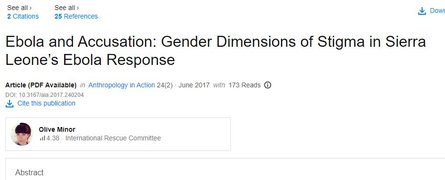
s Response and Resilience Team Anthropologist for Oxfam GB, my role was to support an inclusive, community-led Ebola response through a better understanding of gender dynamics in the context of the outbreak. This case study identified stigma and blame of affected people as key factors in the ongoing epidemic. Despite social mobilisation efforts to address these attitudes, they remained ingrained in the Ebola response at multiple levels: in Government of Sierra Leone quarantine policies, in community by-laws and in everyday social interactions. Negative attitudes put pressure on the roles of men and women in ways that produced barriers to acting on Ebola prevention and treatment advice or creating an inclusive Ebola response. Our findings prompted several improvements in Ebola response activities that Oxfam Sierra Leone carried forward in their work, demonstrating the key role applied anthropology can play in creating a reflexive process to improve the effectiveness of humanitarian aid.
